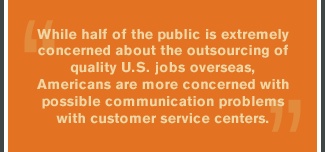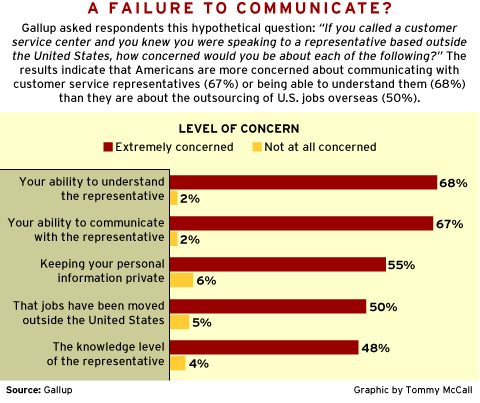Outsourcing American jobs to countries like India and China has been a polarizing issue ever since U.S. companies started shipping different parts of their business processes overseas to capitalize on the differences in labor costs. Businesses of every size, including the U.S. Chamber of Commerce, report multiple outsourcing success stories and expound the benefits of transforming the U.S. economy by creating new trade markets and by sending work overseas.
 |
However, most Americans are more wary of the practice. The majority of Americans say that outsourcing is bad for the U.S. economy. They also report extreme concern with multiple aspects of call center outsourcing specifically, including the ability to communicate effectively with outsourced customer service representatives.
Simply put: American executives should be aware of the fact that, regardless of what their companies think of outsourcing, the vast majority of their customers aren't keen on it.
Bad for the U.S. economy?
Gallup asked more than 39,000 members of its probability-based household panel, which is representative of the U.S. adult population, the following question:
There has been some discussion recently about "outsourcing," which is when American businesses hire workers in other parts of the world in order to save money. Which comes closer to your view . . . Outsourcing is bad for the American economy because it sends good jobs overseas, or, outsourcing is good for the American economy because it keeps the cost of goods and services down?
Based on this definition of outsourcing, 77% of Americans say that outsourcing is bad for the U.S. economy. Thirteen percent of the public says that outsourcing is good for the American economic system, while another 10% say they don't know if outsourcing is good or bad.
Certain subgroups of the American public are more likely than others to say that outsourcing is bad for the U.S. economy. Negative opinions about the impact of outsourcing on America increase with age, and positive opinions increase with education levels. Also, Republicans are more than twice as likely as Democrats to say that outsourcing is good for the U.S. economy.
Outsourced service not foreign to Americans
An increasing number of industry sectors participate in outsourcing. Whether they are specialized manufacturing workers or general customer service representatives, employees from multiple areas of the U.S. workforce are having their job responsibilities outsourced. The public recognizes the changing tides, particularly with respect to call center representatives: Nearly 90% of Americans say that call center representative outsourcing has increased in the past five years.
Call centers aren't the only parts of businesses being sent overseas, but the interaction with customer service associates might be Americans' most likely experience with the effects of outsourcing. Most Americans (90%) say they have called a company's customer service center to get help with a product or service or with a question related to billing. Of those who have called for assistance, 86% say that when they called a customer service center to ask a question or to get help, they believed that they were talking with a representative who is based outside of the United States.
Concern about communication
A majority of the public says that the outsourcing of U.S. jobs is bad for the nation's economy because the practice sends good employment opportunities from the United States overseas. However, other aspects of call center outsourcing are of even greater concern to Americans.
Gallup asked its panelists who said they have called a company's customer service center for help at least once this hypothetical question: "If you called a customer service center and you knew you were speaking to a representative based outside the United States, how concerned would you be about each of the following?" Respondents answered using a scale of 1 to 5, with 1 being "not at all concerned" and 5 meaning "extremely concerned."
The results indicate that while half of the public is extremely concerned about the outsourcing of quality U.S. jobs overseas, Americans are more concerned with possible communication problems with customer service centers.
Specifically, more than two-thirds of Americans (68%) say they would be extremely concerned with their own ability to understand the customer service representative on the other end of the phone. Similarly, a nearly identical percentage of Americans (67%) indicate extreme concern with their own ability to communicate with the call center representative.
More than half of the public (55%) is extremely concerned about outsourced customer service associates' abilities to keep callers' personal information private. Nearly half of Americans say they are extremely concerned about foreign representatives' knowledge levels (48%).
 |
Implications for businesses
Companies that outsource some or all of their customer service operations or those that are considering sending this kind of work overseas might not be surprised that their customers care more about their ability to communicate with customer service representatives than about the fact that jobs are being sent outside the United States. This is because a vast majority of respondents say they've called a customer service representative to have their questions answered and problems solved, while many economists estimate that the jobs lost to outsourcing represent a small percentage of the total jobs in the U.S. economy.
According to public opinion, ensuring that customer service professionals are able to properly communicate with customers and take care of their needs -- regardless of whether they're in Indianapolis or India -- should be the greatest concern to businesses that currently or prospectively outsource work overseas. Americans' concerns about communicating effectively with customer service associates are probably more applicable to their daily lives than the overall business strategy of outsourcing, but that doesn't mean Americans are not concerned about sending U.S. jobs overseas.
So, according to their customers, companies face multiple challenges: convincing the public that outsourcing is the right thing to do for their business and reinforcing their decisions with positive results, such as quality communication between customer service call center associates and their consumers.
